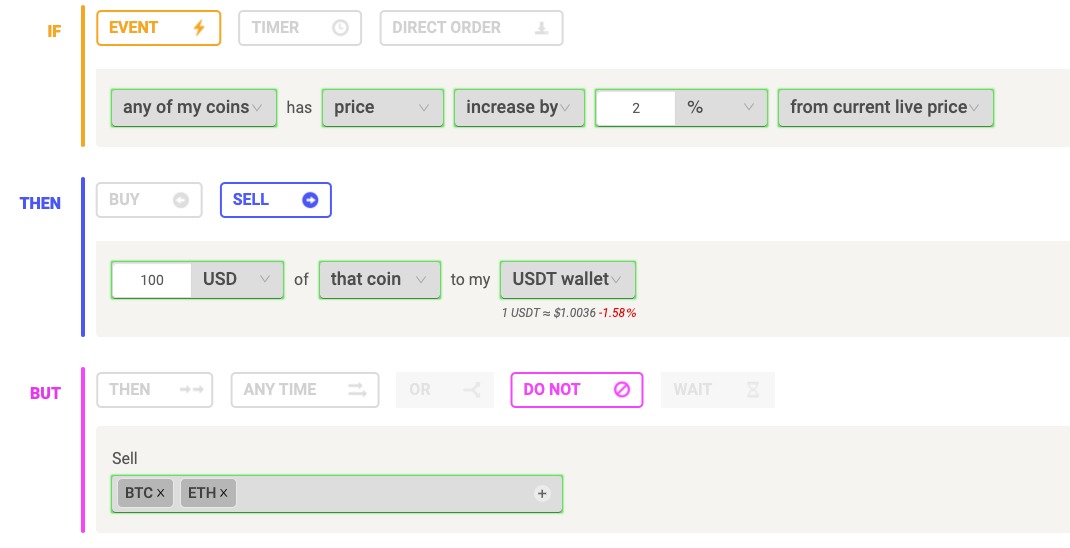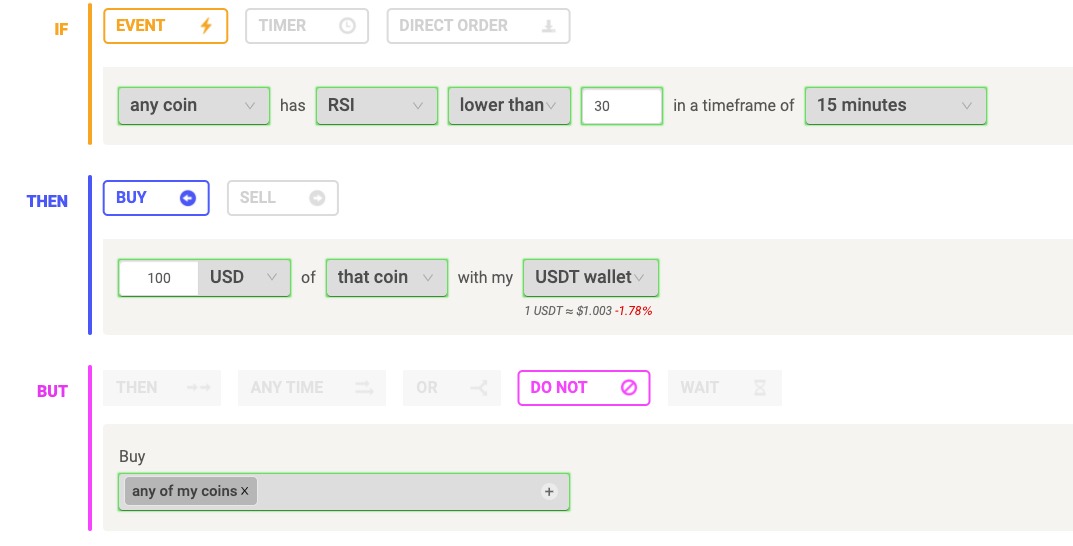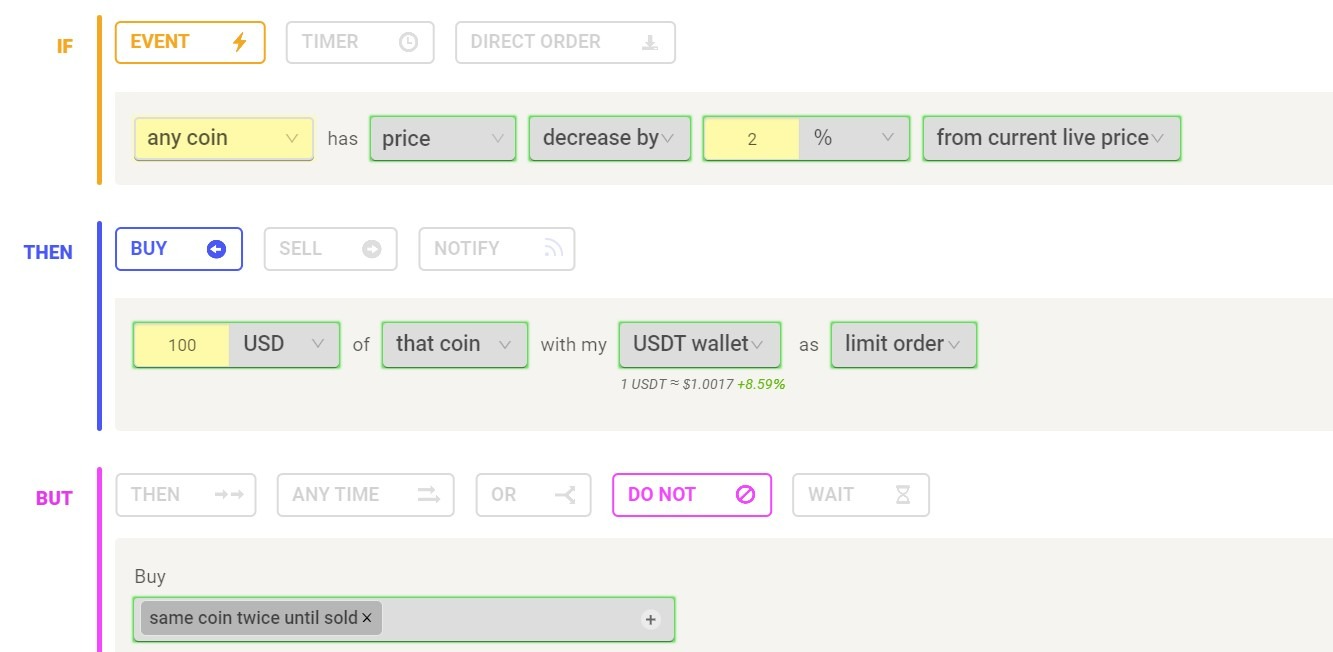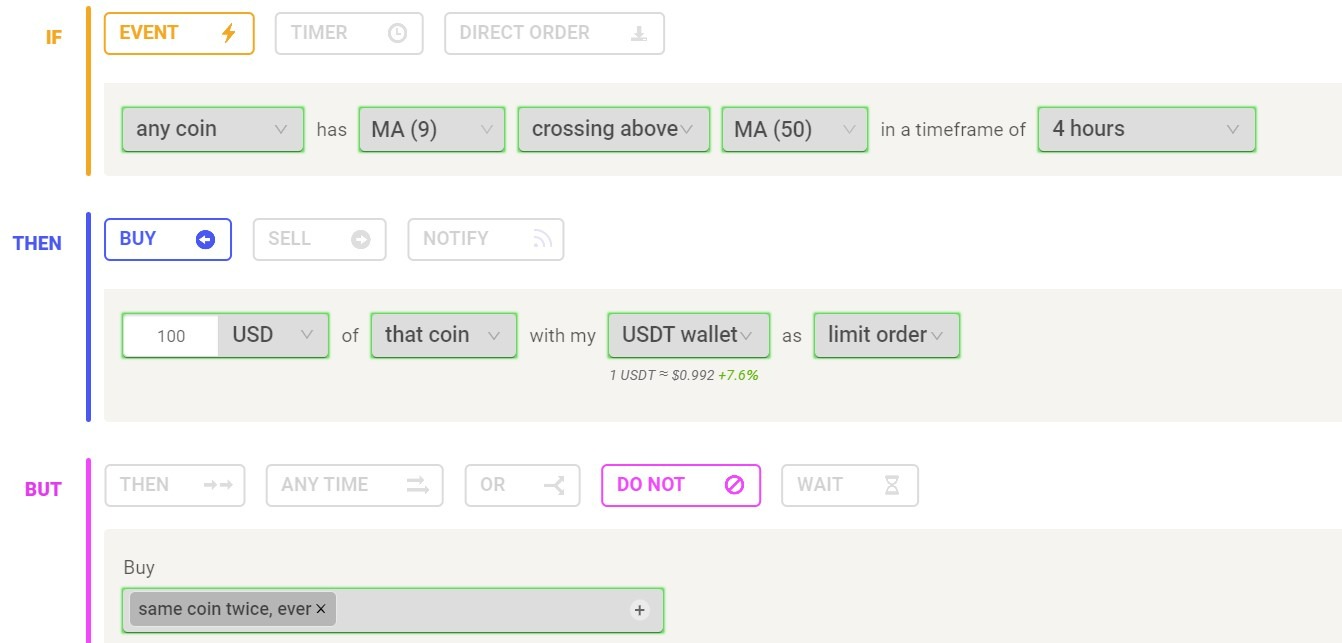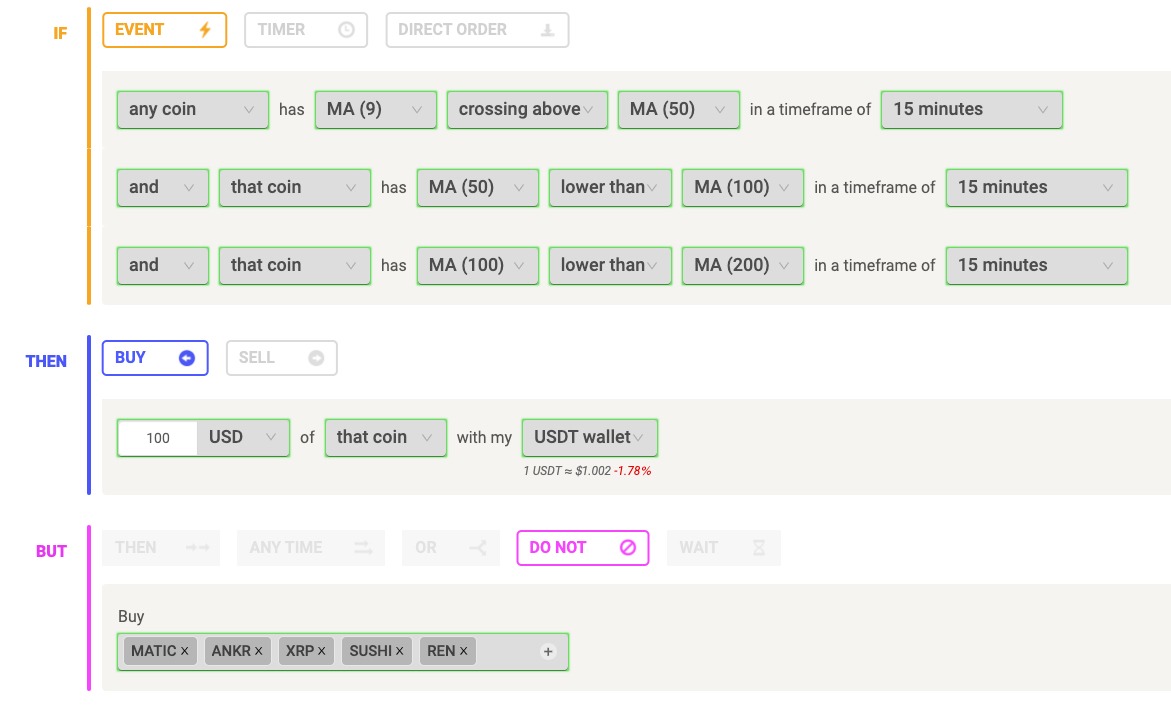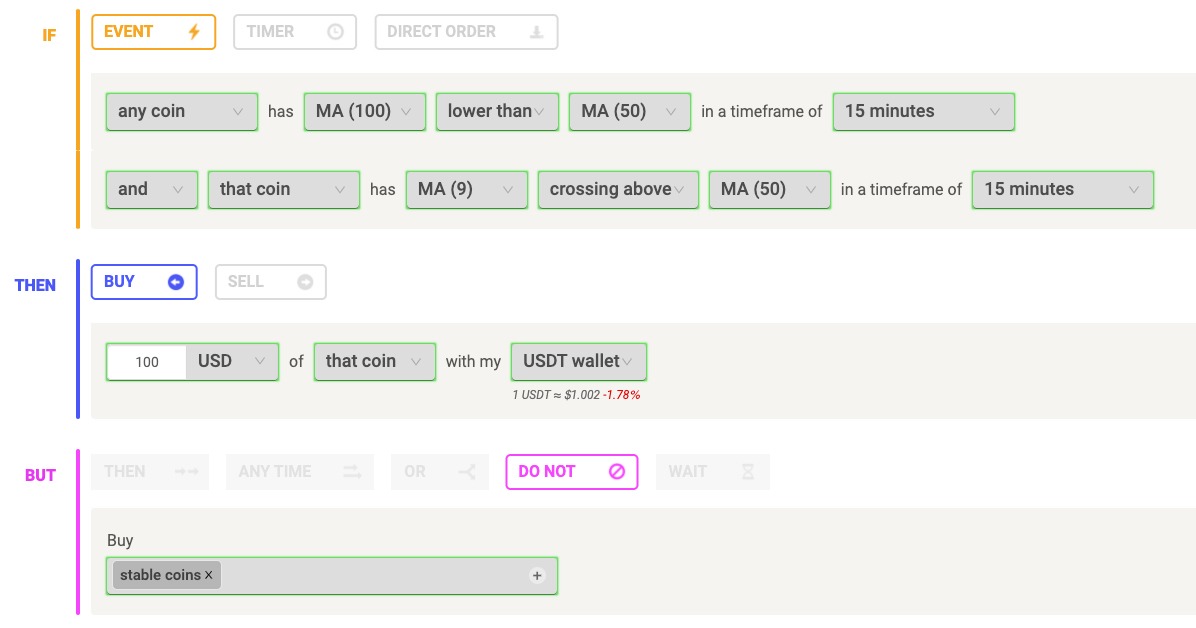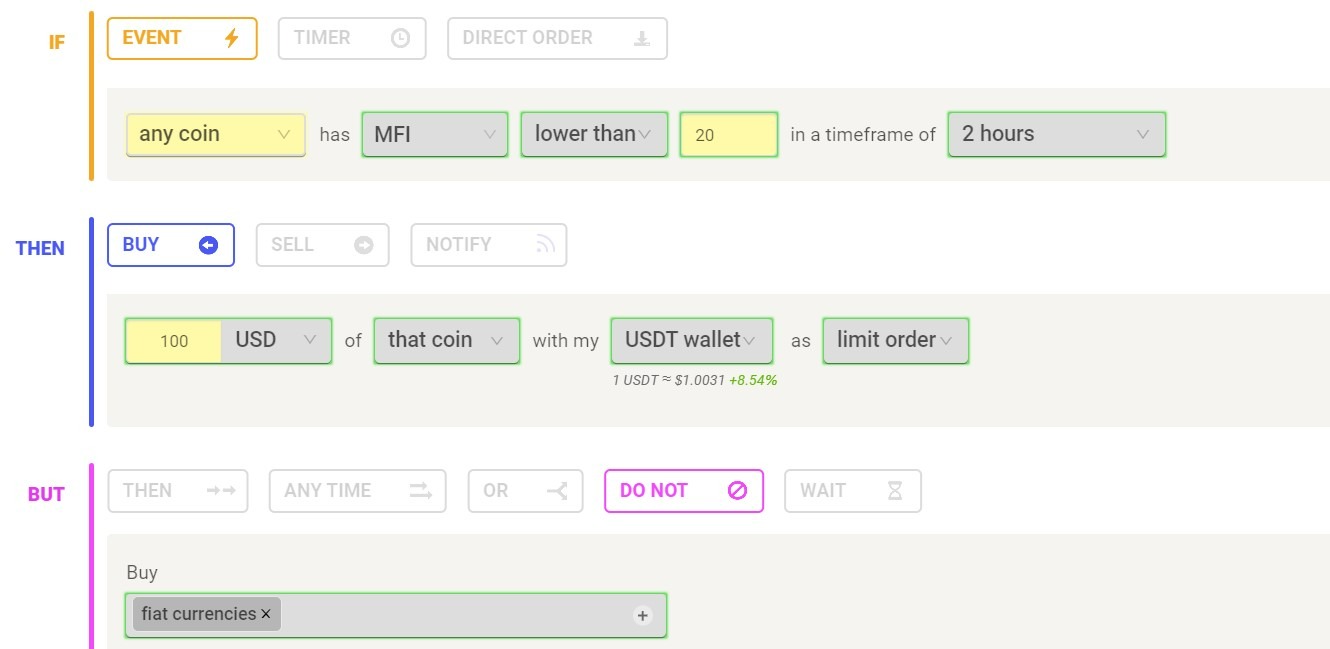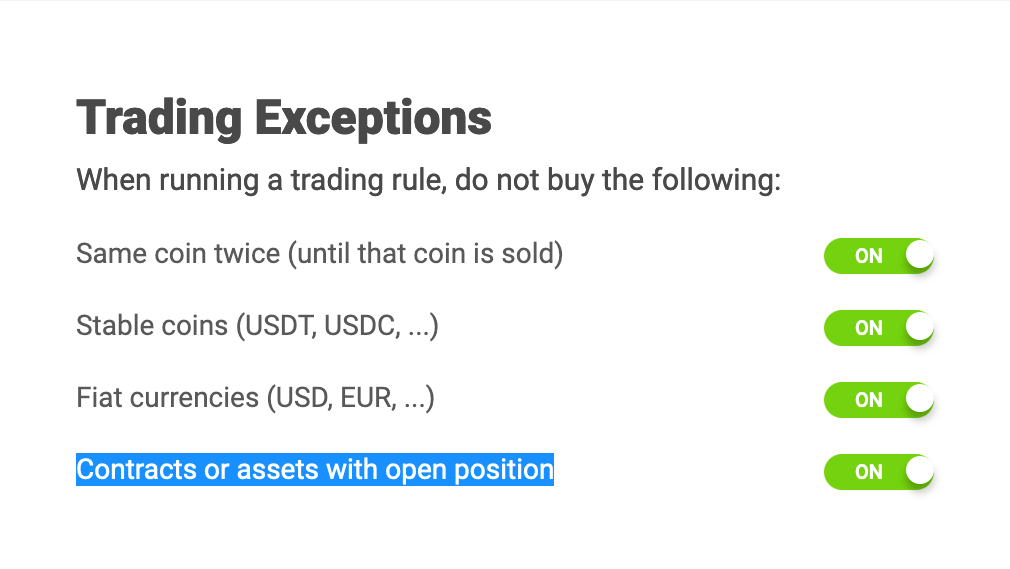The DO NOT Operator
Last updated November 4, 2024
Introducing The 'DO NOT Operator'
Coinrule’s “DO NOT” Operator can be used for several purposes. This article will outline the many benefits of the function and situations to increase the control you have over your rules.
What is the "DO NOT" Operator?
The “DO NOT” Operator is a function that can be incorporated into your rules to prevent it from buying or selling certain coins. There are default pre-set options available when you choose the “DO NOT” Operator.
These include “any of my coins,” “same coin twice until sold,” “same coin twice, ever,” “stablecoins” and “fiat currencies.” You can also specify the coins you do not want your Rule to buy or sell.
The "DO NOT" Operator will always be placed after a buy or sell action. As illustrated in the image below.
Specific Coins
There are many reasons why you may not want your Rule to buy or sell specific coins. For example, if you do not want two rules trading the same coins to interfere with one another.
For example, if one rule is accumulating BTC and ETH, you could choose the “DO NOT” operator on another one and select “DO NOT sell BTC and ETH.” This will prevent the rule from checking BTC or ETH values when looking for potential trades and resultantly not affecting your current wallet balance of those coins. You can choose up to five coins to exclude from your Rule using this function. The example provided above demonstrates how you could construct this rule.
Any Of My Coins
The “DO NOT buy any of my coins” Operator will take a reading of all the coins you have in your wallet when the condition is met. This may include coins that are being used in other rules. It will exclude these coins from being bought. Once the rule, or another rule, sells the coin it can then be rebought as the coin is no longer in your wallet.
Note: the "any of my coins" function is only available when buying coins.
The image below is an example of the “DO NOT buy any of my coins” Operator in use featuring our RSI Classic Strategy .
Same Coin Twice Until Sold
If you want your rule to only have one open position for a coin at any given time, you can use “DO NOT buy same coin twice until sold.” This will prevent the rule from buying a coin again until the coin has been sold. Once the open trade has been closed through a sell, the rule will then buy the same coin again should it meet the conditions you have set up.
For example, if your Rule bought BTC, it would not buy BTC again, even if the conditions were met, as long as it has not sold the BTC position. Once your rule sells BTC, the rule would buy BTC again should it meet the condition.
The behavior of Do NOT buy the same coin twice until sold has been improved such that rules will now buy the coin again even if there is a small "open" amount left due to exchange fees.
Here is an example of the "DO NOT buy same coin twice until sold" function featuring our Buy the Dips Template.
Same Coin Twice, Ever
The “DO NOT buy same coin twice, ever” operator will prevent the rule from buying the same coin after its been sold. Once the rule closes and open trade for a specific coin through a sell, the rule will never buy the same coin again in its lifetime irrespective of the conditions of the rule being met.
For example, if your Rule bought ETH, it would not buy ETH ever again, even if the conditions were met. Once your rule sells ETH, the rule would not buy ETH again should it meet the predefined conditions of the rule.
Here is an example of the "DO NOT buy same coin twice, ever" operator featuring our Golden Cross Rule.
Contracts With Open Position
The 'Do not buy contracts with open position' operator ensures that a rule won't purchase contracts that already have an open position.
This applies whether the position was initiated by the same rule, a different rule, or even if it was opened manually or externally by the user on the exchange.
The do not buy any contract with open position exception has been added to "Trading exceptions" in settings and enabled by default.
Same Contract Twice Until Position Closed
The “DO NOT buy same contract twice until position closed” operator will prevent the rule from buying a contract again until the position has been closed. Once the open trade has been closed through a sell (in case of a long position) or buy (in case of a short position), the rule will then continue to short/long the same contract again should it meet the conditions you have set up.
'Do not buy same contract twice until position closed' operator only applies to contracts bought by the same rule while 'do not buy contracts with open position' applies to any contract with an open position regardless of whether the position was initiated by the same rule, a different rule, or even if it was opened manually or externally by you.
Restricted Coins
Another reason you may want to use the “DO NOT” Operator is when you are trading on an exchange that has certain coins banned in your region. An example of this is Kraken, where users within the US cannot trade MATIC and several other coins. For more context, you can refer to this article .
If you were in the US and using Kraken as your exchange and MATIC met the Conditions of your rule, causing your Rule to buy or sell it, the Rule would not trigger, and you would receive the error message “Exchange rejected trade.”
The “DO NOT” Operator can be used to exclude MATIC, and other restricted coins, from being traded by your Rule - preventing this error message from occurring. The image below features our Moving Average Scalper Template .
Note: We recommend you always review what coins can and cannot be traded on your chosen exchange within your region. This information can be accessed on exchanges' websites.
Stablecoins
There can be instances when your rule, if the Conditions are met, may trade a stablecoin for a stablecoin. An example of this may be your rule buying BUSD on Binance using your USDT wallet. Stablecoins experience very little volatility, often resulting in not being profitable to trade.
To prevent this from happening, you can use the “DO NOT buy stablecoin” function. This will exclude all Stablecoins from the rule when it looks for potential trades.
This example features our Trend-following Scalping With Dynamic Protection Template.
Fiat Coins
In your rule, there may be instances where the conditions are met and the rule may trade a stable coin for a fiat coin. An example of this may be your rule buying EUR on Kraken using your USDT wallet. Fiat currencies are controlled by governments and central banks while cryptocurrencies are essentially decentralized, which may result in them not being very profitable to trade.
To prevent this from happening, you can use the “DO NOT buy fiat currencies” operator. This will exclude all fiat coins from being bought by the rule when it checks for potential trades.
This example features our MFI Overbought and Oversold Template.
Trading Exceptions
You can now set your preferred Trading Exceptions to prevent all your rules from buying "same coin twice until sold", "stablecoins", "fiat currencies" and "contracts with open position".
The Do Not operator allows for a greater level of control over the coins the rule will trade. This way, you can optimize further how every single rule works, increasing the overall returns of your wallet.
Disclaimer: Please note that this article contains affiliate links.


